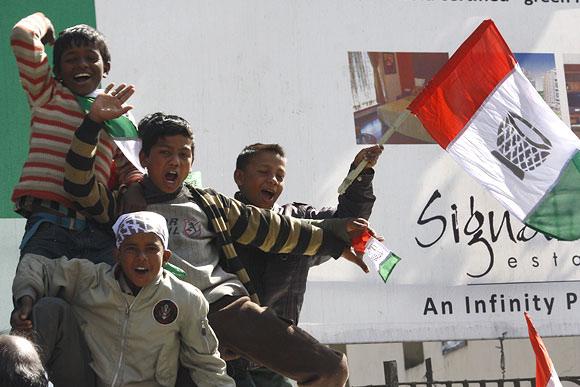
Meghalaya is a land of political contradictions.
One of the most peaceful states in the North-East, only one chief minister has had a full term in office in Meghalaya's 41-year history.
Meghalaya is a woman-dominated traditional society, but the outgoing assembly had only one lady MLA!
Rediff.com's Archana Masih reports from Shillong on the election in arguably India's most politically unstable state.
Photographs: Rajesh Karkera
It's time you knew there is an election in the Northeast
After the high-pitched election campaign of Gujarat two months ago, one of India's most politically unstable states, Meghalaya, is going to the polls.
Meghalaya has seen only one chief minister complete a full term in its 41-year history.
In a state where chewing kwai or betelnut is such a staple, Meghalaya's additional state government secretariat is surprisingly devoid of any paan stains. Its walls are whitewashed; its staircase clean.
Young staff sit behind the reception desk, where the turnstile opens to let you pass after a security person registers his thumb imprint on a sensor detector.
There is scant mention of assembly elections in three North-Eastern states, Meghalaya, Nagaland and Tripura -- that usually go to the polls at the same time -- in the national media.
But be not mistaken that the election for Meghalaya's 60 assembly seats is a tame affair, without the colour and noise of campaigns that bigger Indian states are familiar with.
In the heart of the state capital, Shillong, by the edge of the famous Ward's Lake, the local United Democratic Party car rally with young boys and girls beating the drum, which is the party symbol, and shouting slogans, is led by a spirited young girl.
A Congress motorcycle rally breezes into the North Eastern Hill University campus, unmindful of the fact that it is an education institution.
Elsewhere in the city, cars with Bharatiya Janata Party flags and supporters can be spotted as Election Day, February 23, draws near.
Please ...
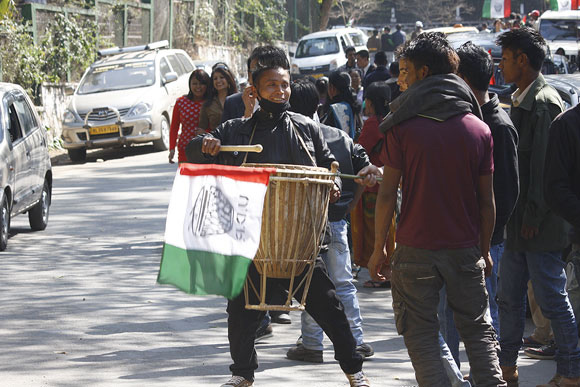
It is not surprising that in a state so steeped in the culture of music, Every Vote Counts, a music CD released by the Meghalaya state Election Commission featuring prominent local singers asking voters to vote, easily blows you away.
Targeted at young voters who are 60 per cent of Meghalaya's electorate, the CD has been sent out to be played on radio and FM channels. So good is the album that its English songs should feature in the playlist of FM channels across the country before any election.
With a tribal population of about 90 per cent, 55 of the state's 60 assembly seats are reserved for tribals.
Meghalaya has 14.89 lakh (1.489 million) voters, with an average of 25,000 voters per assembly constituency.
In terms of numbers, it is miniscule when compared to the larger states of the country -- where probably the whole population of Meghalaya would be equivalent to the population of a district in Maharashtra.
Arguably India's most politically unstable state, Meghalaya has only had one chief minister complete a full term in office since its creation from Assam in 1972.
Since the last assembly election, four different coalition governments have ruled the state.
Please ...

"Political stability doesn't guarantee you anything," says Patricia Mukhim, the editor of the Shillong Times newspaper.
"I don't know if having one chief minister for 5 years is a virtue," she says. "When we had that in Meghalaya, there was no road map for the state, nothing really happened and militancy just shot up."
"Meghalaya has had a history of coalitions. It is in our DNA. We are the ones who introduced funny things like choosing a chief minister through a lucky dip," adds Mukhim, who has been honored with a Padma Shri.
Though Meghalaya is relatively peaceful compared to the other insurgency-afflicted North-Eastern states, Mukhim believes insurgencies in the North-East have ceased to be political and do not represent the voice of the people. They are about extortion and killing, she says.
"The 30-odd (insurgent) groups in Manipur do not represent the people's voices," she says. "They are fringe elements surviving on insurgency, which people say has become an in-house industry."
"The Government of India continues to push development funds without any accountability. Insurgency will continue to spawn itself."
Please ...
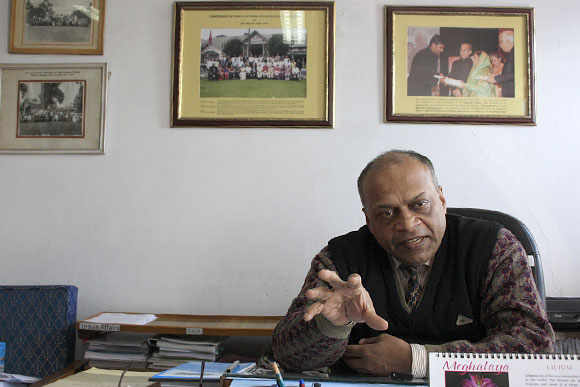
In Meghalaya, the outlawed Garo National Liberation Army is fighting for a separate Garoland in the western region of Meghalaya.
Of the 2,485 polling stations in the state, 700 are deemed hyper- sensitive, which means they will require maximum force and will be manned by central security personnel who have started arriving in the state.
The Election Commission is expected to spend Rs 15 crore (Rs 150 million) on this election. Ten thousand polling staff will conduct the election on Saturday, February 23.
"Every election has its own challenges -- hilly places have their own; plains have their own. Our concern is to create a free and fair environment everywhere," says Meghalaya Chief Election Officer P Naik, an Indian Administrative Officer and native of Karnataka, who has been CEC of the state for the last seven years.
"Some of the pockets in the Garo Hills are slightly more disturbed compared to 2008," adds Naik. "We hope things will be under control once the forces start dominating the area."
Please ...
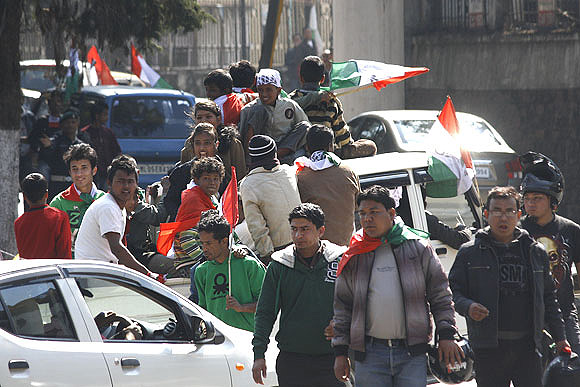
The sensitive booths are categorised as those on the international borders (with Bangladesh), along the inter-state border, and -- believe it or not – those that are elephant-infested, which highlights some of the unique challenges faced by the Election Commission in conducting elections in the Indian Union.
As the polling staff prepares for polling duty, training programmes are being conducted to prepare them for election day.
Mock poll drills are being undertaken so that election staff know exactly what is to be done that day and how to tide over any situation.
"We have been told that 200 metres around the polling booth is within our authority and we should not be intimidated by anyone while we conduct the poll," says a polling officer.
"The handbook given to us seems to have taken into account every kind of situation -- it also tells you what you need to do if a voter with no hands comes to cast his ballot."
Please ...
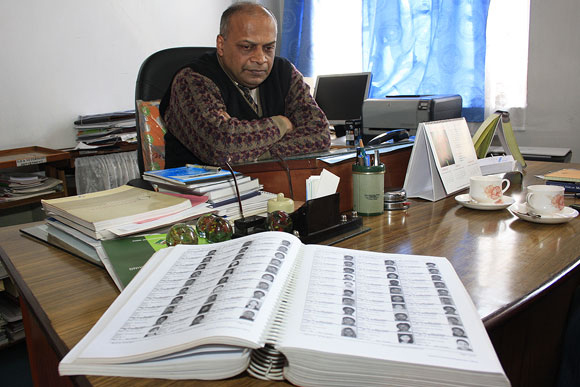
With 89 per per cent voting, the voting percentage in Meghalaya is among the highest in the country. Neighbouring Tripura recorded 90 per cent in the last election.
The reason for the high voting percentage is primarily person to person contact where the candidates mostly know the constituents or know voters because Meghalaya is a small society based on a clan system.
"On an average, there are 4,000 to 5,000 households per constituency, much smaller compared to areas in the plains," says state Chief Election Commissioner Naik, "but because of this, every vote becomes more important so the campaign becomes very intensive."
"Here, it is not about having processions like in other places. Door to door campaigns are very important," Naik adds.
This is probably the first election where the Election Commission is keeping a close watch on social media -- candidates advertising on Facebook, for instance.
"We have no objection to campaigning through the friends network, but if you are advertising on Facebook, then it has to be accounted for and certain guidelines have to be followed -- like it should not be communal," says Naik, who has also had a six-year stint at the Indian Space Research Organisation.
Please ...
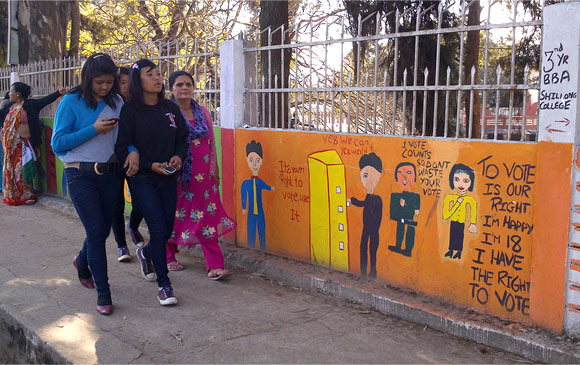
For a matrilineal society, Meghalaya surprisingly has a very poor record in women's participation in politics.
The outgoing assembly only had one lady MLA!
"Rajiv Gandhi thought we had a traditional system and that is why we did not need Panchayati Raj, says Shillong Times Editor Patricia Mukhim. "So Panchayati Raj was exempted from taking place here and that has impacted women's participation in governance."
"Women are not involved in the decision-making process in the traditional institutions," she adds.
Disappointed with the lack of dialogue between the seven North-Eastern states for tackling its development needs, Mukhim believes the Union ministry for the development of the North-Eastern region set up almost a decade ago has failed the region.
It has, she feels, been reduced to functioning as a post office to drop proposals and petitions.
Please ...
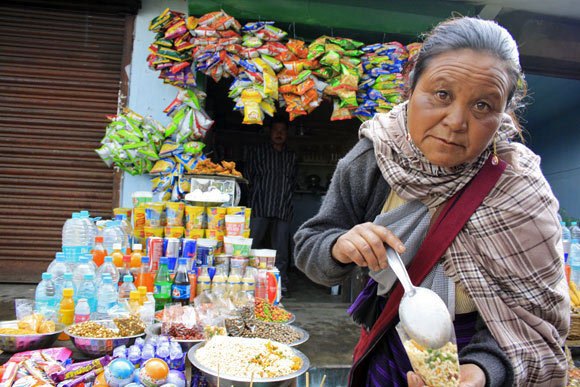
The Constitution has not really taken roots in Meghalaya, feels Shillong Times Editor Mukhim. Just holding an election every five years, she says, does not mean anything.
Representatives on the district councils, which is a creation of the Sixth Schedule of the Constitution -- pertaining to administration in the tribal areas of the country -- have themselves not read it and don't know their mandate, she points out.
"We are caught between tradition and modernity. When it suits us, we go to the traditional institutions for redressal. When it doesn't, we go to the courts. This is something that is really deforming us. It is a hotch-potch," adds Mukhim.
"But why talk about only Meghalaya?" she asks. "The whole country is in chaos. We are no different."